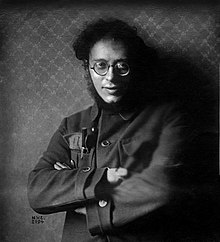Karl Radek | |
|---|---|
 Radek in 1919 | |
| Born | Karol Sobelsohn 31 October 1885 |
| Died | 19 May 1939 (aged 53) |
| Nationality | Polish |
| Citizenship | Russian Empire, Soviet Union |
| Occupation(s) | Revolutionary, writer, journalist, publicist, politician, theorist |
| Years active | 1904–1939 |
| Organization | Communist International |
| Known for | Marxist revolutionary activism |
| Political party | |
| Spouses |
|
| Children | Sofia Karlovna Radek |
Karl Berngardovich Radek (Russian: Карл Бернгардович Радек; 31 October 1885 – 19 May 1939) was a revolutionary and writer active in the Polish and German social democratic movements before World War I and a Communist International leader in the Soviet Union after the Russian Revolution.
Radek was born to a Jewish family in Lemberg, Austria-Hungary. He joined the Social Democracy of the Kingdom of Poland and Lithuania and took part in the 1905 Russian Revolution in Congress Poland. Two years later he was forced to flee to Germany, where he worked as a journalist for the Social Democratic Party of Germany. After the outbreak of World War I, Radek relocated to Switzerland and became an associate of Vladimir Lenin. Following the February Revolution, Radek helped organize the return of Lenin and other Russian revolutionaries to Russia, though he himself was denied entry until after the October Revolution. As Vice-Commissar for Foreign Affairs, he took part in the negotiations of the Treaty of Brest-Litovsk. He helped establish the Communist Party of Germany after the revolution began, and spent a year in prison for his role in the Spartacist uprising.
After returning to Russia, Radek became a member of the Comintern Executive Committee. The failure of the revolution in Germany, as well as his support for Leon Trotsky against Joseph Stalin, ultimately led to his fall from power and expulsion from the Party. He later recanted his views and was re-admitted to the Party. Nevertheless, during the Great Purge Radek was accused of treason and arrested. He was found guilty as a chief defendant at the second Moscow Trial in 1937 and sentenced to 10 years of penal labor. He died in a labor camp in the Urals two years later.